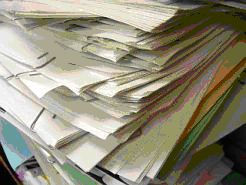Business Papers: What to dump after the Turn of the Year
At the latest when spring cleaning comes around, you notice all these documents are only "wasting" space and "gathering dust". This article will tell you what you must keep and what you can get rid of.
Tax documents are to be kept for at least 10 years (§147 IV AO). However, just because it turned 2010, you cannot automatically dispose of these documents. The storing period starts after the calendar year after the last entries have been made.....
These documents are:
- accounting receipts,
- accounts,
- annual financial statements,
- customs documents which the customs office waived to see or might later want to see (art. 77 I, 62 ZK),
- inventories,
- other organizational documents (when they have some kind of tax relevance),
- received business letters, copies of sent business letters,
- records,
- supplementary documents needed to understand the monetary situation.
May I store these documents electronically?
Generally, yes! When you do so the documents must be stored in an open format that is accessible even from newer programs. This practically means PDF or TIFF. Make sure that the documents are an exact(!) copy of the original. As an example, it is not sufficient to scan booking items as they were received – i.e. without booking remarks. It will suffice when these documents show the receipt stamp and booking marks. However, this is not permitted for:
- annual financial statements,
- opening balance sheets,
- custom documents.
Who cares what these rules what these rules might say. I don't want to keep that junk! What will be the consequences when I dump everything?
In every business day of life, you will not feel the consequences. Any consequences will be an issue when a tax audit is held and the officer wants to see certain details. The consequences are that you will have a lack of evidence. You bear the burden of proving your tax situation. Not so much will your income be questioned but much more the expenses. No bill, no deduction. It's simple as that! Payroll auditing typically ought to happen every three years.
§
I have been audited? Can I now throw the stuff away?
No! The law wants you to keep all details for at least ten years. "Basta!" You never know which ideas an auditing tax official might come up with....
§
An Example:
The annual financial statement for 1999 was drawn in August 2000. In this case, the savings period is as follows:
- Begin of storage period: December 31, 2000
- Permitted disposal of documents: January 1, 2011
Practical Hint for your Archive
It makes sense to store these "unnecessary" details in a special room (or rooms) called "archive".
Since the documents of each business year have a different storage period, it is recommendable to store everything sorted by year of archiving.
In order to maintain an overview, do not keep anything else in that room. Practice shows that documents are to be sorted by topic / contents and then in binders in shelves in the archive.
Note:
The storing period is purposely set to 10 years in this article even though some documents only need to be saved for six years. Since the exact differentiation is ambiguous, I decided to play safe and took the strictest rule. When your cellar, um archive, is already to full to the brim then consider renting storage space or as an imposition assign somebody to digitalize everything. They do not have to be produced instantly. Some other statutes might have not as long storage periods but these periods do not influence the above mentioned rules. Tax requirements, when in doubt, prevail over other!
Oh, you working in an eOffice or paperless office? Fine! Then just store the unneeded data on another hard disk of an external drive and store it safely.
